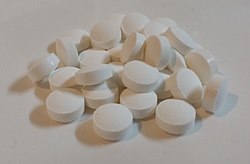|
葡萄糖酸锌(化学式:C12H22O14Zn)是锌的葡萄糖酸盐,是一种离子化合物,由二价锌离子和葡萄糖酸根构成,多见于膳食补充剂中,用以补充锌元素[1][2][3]。
制备方法
葡萄糖酸锌可经由葡萄糖酸与氧化锌或乙酸锌反应来制得[4]。
物化性质
葡萄糖酸锌呈白色结晶或粉末,易溶于水,不溶于有机溶剂。葡萄糖酸锌可以水合物形式存在,最高可形成三水合物[5][6][7]。
药用
葡萄糖酸锌作为锌化合物,可用于预防或治疗锌缺乏症[3]。
世卫组织建议在用于缓解腹泻引起的脱水症状的口服补液配方中加入葡萄糖酸锌
[8][9]。葡萄糖酸锌等锌盐也用于预防或治疗感冒[10][11]。一项以两种安慰剂为对照的双盲研究表明,服用葡萄糖酸锌片剂可将感冒症状的严重程度降低约40%,并使病程缩短三到四天,但常产生胃肠道副作用[12][13][14]。
根据1998年发表的一项以小儿为实验对象的研究,片剂形式的葡萄糖酸锌对小儿普通感冒没有明显的缓解作用[15]。而在以成人患者为实验对象的十项研究中,五项研究报告了锌对感冒有积极缓解作用,但其他五项研究未发现其有效性[16][17]。在另一项对照研究中,通过鼻腔给药的葡萄糖酸锌对于鼻病毒感染引起的感冒症状没有缓解作用;鼻腔滴入葡萄糖酸锌后,个别病例出现了永久性的嗅觉丧失[18][19][20]。
參考資料
- ^ PubChem. Zinc gluconate. pubchem.ncbi.nlm.nih.gov. [2020-08-17]. (原始内容存档于2021-12-03).
- ^ Zinc Gluconate Compound,Ferrous Gluconate Compound,Zinc Gluconate Chemical,Ferrous Gluconate Chemical. www.trivenichemical.com. [2020-08-17]. (原始内容存档于2021-06-16).
- ^ 3.0 3.1 Zinc: Uses, Side Effects, Interactions, Dosage, and Warning. www.webmd.com. [2020-08-17]. (原始内容存档于2022-12-11).
- ^ Hui Feng, Zhiwei Xu, Qianfeng Li, Xiuru Wang, Qiuyue Song, One pot synthesis, characterization and mechanism of zinc glycinate monohydrate, (德文)
- ^ George A. Burdock, Encyclopedia of Food and Color Additives, CRC Press: pp. 2999, (德文)
- ^ Sumitra Ramachandran, Pierre Fontanille, Ashok Pandey and Christian Larroche. Gluconic Acid: A Review (PDF). Food Technology and Biotechnology. 2006, 44 (2): 185–195 [2006-12-06]. (原始内容 (PDF)存档于2018-03-11).
- ^ Henk G.J. de Wilt. Part I: The oxidation of Glucose to Gluconic Acid. Ind. Eng. Chem. Prod. Res. Develop. 1972, 11 (4): 370. doi:10.1021/i360044a002.
- ^ W. U. Khan, D. W. Sellen: Zinc supplementation in the management of diarrhoea (页面存档备份,存于互联网档案馆), WHO April 2011
- ^ Zinc and other micronutrients - Diarrhoea, Diarrhea, Dehydration, Rehydration - Rehydration Project. rehydrate.org. [2020-08-17]. (原始内容存档于2022-03-24).
- ^ Marshall, S. Zinc gluconate and the common cold. Review of randomized controlled trials. Canadian Family Physician Medecin De Famille Canadien. 1998-05-01, 44: 1037–1042 [2020-08-17]. PMC 2277668
 . PMID 9612589. (原始内容存档于2022-09-29) –通过PubMed. . PMID 9612589. (原始内容存档于2022-09-29) –通过PubMed.
- ^ Eby, G. A.; Davis, D. R.; Halcomb, W. W. Reduction in duration of common colds by zinc gluconate lozenges in a double-blind study. Antimicrobial Agents and Chemotherapy. 1984-01-01, 25 (1): 20–24 [2020-08-17]. PMID 6367635. doi:10.1128/aac.25.1.20. (原始内容存档于2022-10-15) –通过PubMed.
- ^ Europäische Behörde für Lebensmittelsicherheit: Wissenschaftliches Gutachten: Nahrungsergänzungsmitteln für Ernährungszwecke zugesetztes Chrompicolinat, Zinkpicolinat und Zinkpicolinatdihydrat.. [2020-08-17]. (原始内容存档于2013-08-10).
- ^ Sherif B. Mossad: Zinc Gluconate Lozenges for Treating the Common Cold. In: Annals of Internal Medicine. Nr. 125, 1996, S. 81, doi:10.7326/0003-4819-125-2-199607150-00001.
- ^ J. C. Godfrey, B. Conant Sloane, D. S. Smith, J. H. Turco, N. Mercer, N. J. Godfrey: Zinc gluconate and the common cold: a controlled clinical study. In: The Journal of international medical research. Band 20, Nummer 3, Juni 1992, S. 234–246, ISSN 0300-0605, PMID 1397668.
- ^ Zinkgluconat wirkt bei Kindern nicht (页面存档备份,存于互联网档案馆), deutsche-apotheker-zeitung.de, abgerufen am 14. Februar 2016.
- ^ Meenu Singh, Rashmi R. Das: Zinc for the common cold (Intervention Review). The Cochrane Library. [2011-02-17]. (原始内容存档于2011-02-19).
- ^ Zink hilft bei Erkältungen. (页面存档备份,存于互联网档案馆) Spiegel Online, 16. Februar 2011.
- ^ Zink Therapie[失效連結] Deutsches Grünes Kreuz für Gesundheit e. V., abgerufen am 16. Februar 2016.
- ^ Warnings on Three Zicam Intranasal Zinc Products. web.archive.org. 2009-06-17 [2020-08-16]. 原始内容存档于2009-06-17.
- ^ FDA Advises Consumers Not To Use Certain Zicam Cold Remedies. web.archive.org. 2009-06-17 [2020-08-16]. 原始内容存档于2009-06-17.
|

